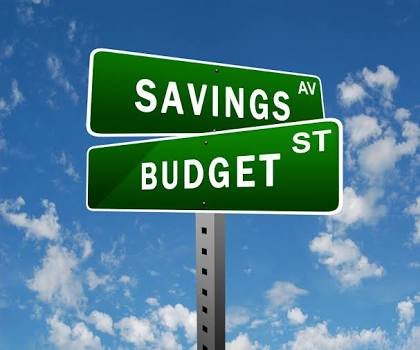Learning to budget and save your hard earned money
.jpeg)

Saving money is very important, you have to make sure that you're putting money aside every single month, but the problem is, most people don't budget and manage their money in the first place. Most people are living from salary to salary, where whatever money earn goes is directed towards paying for expenditures consequently leading to lack of positive cash flow which enables them save and invest. If you're living that way, if you're living month to month, paycheck to paycheck and you're not saving any money then you're stuck in what is called the rat race, the rat race basically means that you're never going to be able to get ahead, because you're just repeating the same cycle, you're not taking the money that you can save, that you can invest, and help use to build your financial future, to build your business, to make passive income etc. The most important thing you need to understand before you're in a position where you can invest money and all that sought of stuff, is you've got to make sure you manage your money and you set up a budget. A budget is basically where you say that you're not going to spend more than x amount of money and you've got to decide what that is, what you can be able to pull off, budgeting is one way to makes some sought of sacrifice in your life which should be understandable, if you want to save. You've got to think ahead for your future, you can't just live for and think about today, you've got to think ahead and prepare for the future and that means sacrificing some instant gratification, you've got to delay gratification, and make a sacrifice.
In budgeting, you've got to decide how much your budget is going to be, and you're not going to exceed what that is. What you should do before that is make a list of all your existing current expenses, go through your credit cards, your debit cards, your online banking, your statements, go through your receipts, whatever you've got to go through and go through every single transaction that you have and add it all up, because the first place to start is you're going to know exactly where you're at, you've got to know exactly where your monthly expenses are and how much it is you're spending on a month to month basis, what you should is go back several months, because you've got to see what the pattern is, and it's even better if you can categorize it into different categories and a great way of this is by using a software; Microsoft Excel, a Google spread sheet, you can use numbers if you're on Mac but actually set up a spread sheet and track it whatever way that you want, and add it up exactly how much you spend on a month to month basis, on your rent or on your mortgage, whatever that number is, write it down, put it under a column or a category and that's exactly what you're monthly rent or mortgage is.
.jpeg)
You should make a category where you'd be putting in all your expenditure for each month, again go back several months, know exactly what the expenditures are. You may have made expenses over what your traditional expenditure is, but you've got to be able to give account. You have to look at your internet bill, your gym membership, you have to look at how much money you're spending on a monthly basis to your buying groceries, eating out, entertainment; such as going to movies, playing video games etc. Again these are all different categories, you've got to look through all your transactions, your statements ,add exactly what that is to know exactly where you're at. Your car expenses , gas or petrol, transportation, taking a taxi, whatever that is, break it up in categories. Make another category which could be for personal development such books or courses, a coach, a mentor, tuition payment, Student Loan, whatever it is, you've got to be able to keep track. Sum up the whole thing to know your monthly expenditures for the previous months. When you look at that number, it's going to be a eye opener for you, you're going to actually realize the reality of how you're living. What you're also going to do is that you're going to add up and track exactly how much you're making every month as well, so that's exactly what you get as salary, your business, investments, or other income streams, but you've got to make sure you track all of that as well, and you've got to know exactly what that is, so basically by doing this exercise, you're going to have a list and you're going to exactly know what your expenses are and what your income is. You should always make sure that your income is higher than what your expenses are and you have what is called the positive cash flow, very important that's what is going to allow you to save money every month, that's what is going to allow you to invest, to build a business, to do whatever it is you want to do and have that savings for whatever it is you want to invest in.
If you find that your expenses are too high, then you've got to set up a budget, you've got to decide again; how much do I want to save every month, it it a hundred bucks a month, is it a thousand bucks a month, and look at ways that you can cut down and lower your expenses. So that's creating a budget, so you might decide that your budget is that you're not going to spend $200 a month eating out, you're going to enforce that, that's what the budget is, or you're not going to spend $200 a month on clothing, or whatever it is that's taking so much of your money.

